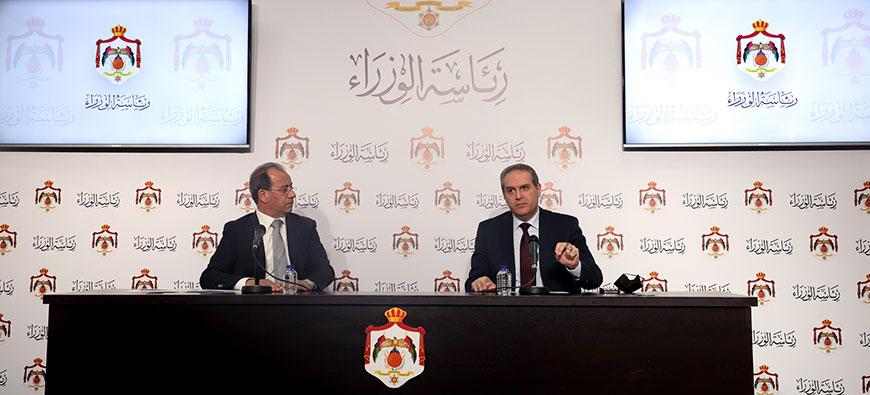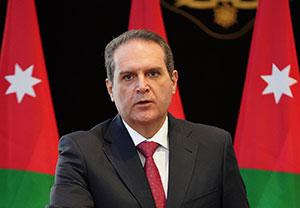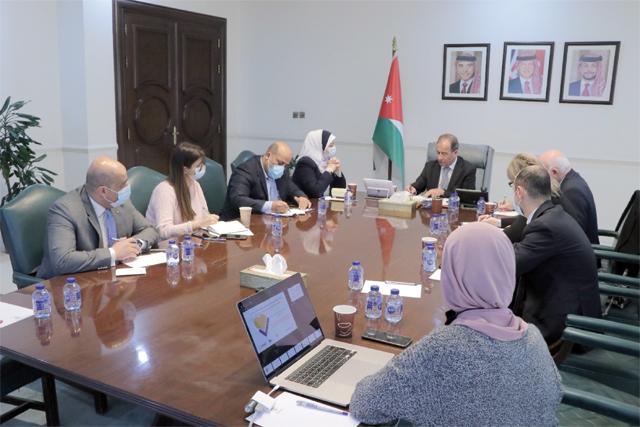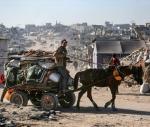You are here
Gov’t to ease COVID restrictions as of March 1
By JT - Feb 17,2022 - Last updated at Feb 17,2022

Minister of State for Media Affairs Faisal Shboul and Health Minister Feras Al Hawwari hold a joint press conference at the Prime Ministry on Thursday (Petra photo)
- PCR test not mandatory for arrivals to Kingdom
- Inoculations for children between ages five and 11 to begin next week
- In-class education in schools to start Sunday
AMMAN — The government on Thursday announced new eased procedures to deal with the COVID-19 pandemic, which were suggested by the National Epidemiological Committee depending on developments of the epidemiological situation.
Minister of State for Media Affairs Faisal Shboul, during a joint press conference with Health Minister Feras Al Hawwari at the Prime Ministry, said that the new procedures will come into effect as of March 1, the Jordan News Agency, Petra, reported.
These procedures include reducing the quarantine period for infected people to five days starting on the date of the sample without the need to conduct another PCR test, said Shboul, who is also the government spokesperson.
The minister added that the procedures include cancelling quarantine for people who came into contact with COVID-19 patients and cancelling PCR tests for arrivals to the Kingdom at airports, land and sea crossings, whether they are Jordanians or non-Jordanians.
The procedures also cancelled the requirement for a PCR test to attend concerts, weddings or gatherings, in a way that does not violate Defence Order No. 35 that stipulates being vaccinated with two shots as a pre-condition to enter public and private facilities.
Shboul also reiterated that in-class education will start on Sunday with the cancellation of the 10 per cent condition to switch education in a certain class or schools to online.
Students who test positive with the virus will still be required to isolate for five days starting from the date of sample before they can resume in-class education, without the need of a second PCR test.
The minister added that new procedures include issuing the epidemiological report on a weekly basis instead of daily after the end of the current wave in the Kingdom, stressing that the pandemic is still ongoing locally and globally, where all decisions are subject to health developments.
In this regard, he said that there are three paths to deal with the pandemic and limit its spread after these eased procedures: The first is going on with the national vaccination programme, especially given His Majesty King Abdullah has exerted significant efforts to secure four vaccine types to inoculate a high percentage of citizens and residents.
The minister said that HRH Crown Prince Hussein directly supervises campaigns that stakeholders launch to encourage vaccination campaigns, noting that the focus now is directed to encourage the public to receive the third jab, which will increase their immunisation, mainly against the Omicron variant.
The second path is related to the health system in the Kingdom, which has tripled in its capacity to face the pandemic.
The third path deals with personal responsibilities of the public in terms of turnout to receive vaccines and commitment to preventive measures, such as wearing masks, maintaining physical distance and using sanitisers.
Replying to a question, Shboul stressed that the government is going on with applying the Defence Law and relevant orders to deal with any future waves of the pandemic, and for other reasons, such as supporting the most affected sectors of the pandemic, preserving the rights of employees in the private sector and continuing the national vaccination programme.
Hawwari said that the pandemic has not ended yet, noting that the government is issuing eased procedures gradually in light of the virus’ variants.
The minister called on the public to receive two shots of the vaccine and a third one for those who took the second jab for periods over three months to increase immunity against the virus and its variants, noting that the ministry will embark on inoculating children between the ages of five and 11 as of next week.
He added that more than 70 per cent of the targeted group of those who are at least 18 years old have received the vaccine, while the percentage among school students aged between 12 and 17 stands at only 20 per cent.
Hawwari said that the Omicron wave witnessed a drop in death cases and hospitalisation rate stood at 1.5 per cent, stressing that last week registered the highest rates in the fourth wave, which have now started to decline.
The minister said that this increase in infections has boosted community immunity, expecting future variants, if any, to be weaker.
Related Articles
AMMAN — Health Minister Feras Al Hawari on Thursday issued a circular to embark on applying new eased procedures to deal with the pandemic a
AMMAN — Eased COVID-19 restrictions, which will come into effect as of Tuesday, are a step towards a gradual return to normal life and will
AMMAN — The epidemiological situation in Jordan is still stable despite the fluctuation in the numbers of COVID-19 deaths and infections, He

















